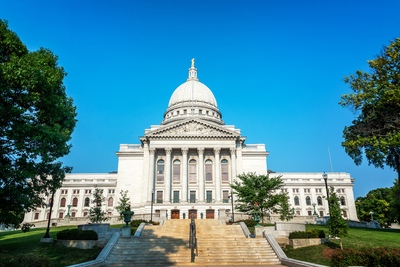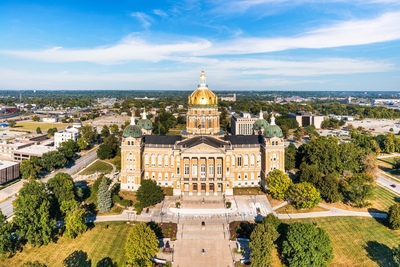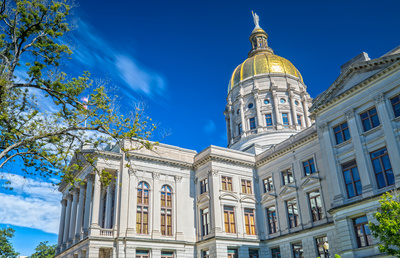
Elections & Campaigns
2026 State Elections Could Reshape Trifecta Control (States to Watch)
February 5, 2026 | Bill Kramer
October 18, 2018 | Morgan Scarboro
Update: Since the original publication of this article, the Hawaii Supreme Court struck down the Surcharge on Investment Properties to Fund Public Education Amendment.
Voters in 19 states will weigh in on a variety of tax policy ballot measures next month. Of the 157 initiatives on the ballot this November, nearly 20 percent of them are related to tax policy. Many of the measures — like those in Arizona, California, Florida, Oregon, and Washington — seek to limit legislative authority to increase taxes. Other ballot measures range from investment surcharges in Hawaii to allowing school sales tax referendums in Georgia.

Arizona Proposition 126: Prohibit New or Increased Taxes on Services Initiative
Proposition 126 addresses the taxation of services. Passing Proposition 126 would create a constitutional amendment that would prohibit the state and local governments from levying any new taxes or raising existing ones on services. Currently, Arizona generally exempts services from the sales tax, but supporters of the proposition say the protection is necessary due to a recent failed legislative proposal that would have imposed the sales tax on services while lowering individual income tax rates.
California Proposition 5: Property Tax Transfer Initiative
Proposition 13, a ballot initiative passed in 1978 that reduced property taxes in the state, remains a point of contention in California. Although it continues to be the subject of debate 40 years after passage, it still enjoys widespread support in the state. Proposition 5 would expand some of Proposition 13’s benefits by allowing eligible homeowners (those 55 or older or severely disabled) to transfer the adjusted tax-assessed value from their previous home to their new home, regardless of the new home’s market value, location, or the number of moves.
California Proposition 6: Voter Approval for Future Gas and Vehicle Taxes and 2017 Tax Repeal Initiative
Proposition 6 would repeal the 12 cents per gallon gas tax increase enacted last year, and it would require voters to approve new fuel taxes and vehicle fees going forward. If California voters decide to approve Proposition 6, lawmakers will need to find a new way to make up $52.4 billion and provide the state with the necessary funds for roads and bridges.
Colorado Amendment 73: Establish Income Tax Brackets and Raise Taxes for Education Initiative
Amendment 73 would increase the state’s corporate and individual income tax rates while reducing the
Florida Amendment 2: Permanent Cap on Nonhomestead Parcel Assessment Increases Amendment
Amendment 2 would make permanent the 10 percent cap on
Florida Amendment 3: Voter Approval of Casino Gambling Initiative
Amendment 3 gives voters the opportunity to decide if they have the exclusive right to approve casino gambling in the state. If the ballot measure passes, only voters would be able to approve casino gambling in the state, not the state legislature or a legislatively referred ballot measure.
Florida Amendment 5: Two-Thirds Vote of Legislature to Increase Taxes or Fees Amendment
Amendment 5 would require a supermajority of two-thirds of the legislature to enact new taxes or raise existing ones in the Sunshine State. A similar amendment passed on the ballot in
Georgia Referendum A: Homestead Municipal Property Tax Exemption Measure
Referendum A would provide a homestead exemption for certain narrowly defined municipalities, like those in the Atlanta area, in Georgia.
Amendment 1 would dedicate up to 80 percent of the sales and use tax revenue collected from sporting goods stores’ sales to the Georgia Outdoor Stewardship Trust Fund, which aims to protect and preserve conservation land.
Georgia Amendment 5: School Sales Tax Referendums Amendment
Amendment 5 would amend the state’s constitution to allow a school district or group of districts to call for a 1 percent sales tax referendum. The tax would last up to five years and revenue would be split between the school districts in the county according to an agreement between the schools, or if an agreement is not reached, divided based on student enrollment in all of the districts.
Hawaii Surcharge on Investment Properties to Fund Public Education Amendment
Previously, Hawaii voters were poised to decide whether to apply a surcharge to investment properties and devote the revenue to public education. The surcharge amount and the properties to which it would have applied were unknown and to be decided by the legislature at a later date if the measure passed. The Hawaii Supreme Court, however, struck the initiative down just a few weeks before the November election, so any votes cast on the issue will not be counted. The justices said that the “ballot question as written does not comply with the requirements of [the state law] that the language and meaning of the ballot question be clear and not misleading.
Louisiana Amendment 4: No Dedication of Transportation Trust Fund Revenue to State Police Amendment
Amendment 4 would end the practice of dedicating revenue from the Transportation Trust Fund to the state police for traffic control. Governor John Bel Edwards ended this practice, but passing the amendment would prevent future legislators and governors from resuming the practice.
Louisiana Amendment 5: Special Assessment for Homes in Trusts Amendment
Amendment 5 would create a constitutional amendment in Louisiana that would allow a special assessment on specific properties in trust, such as those for disabled veterans or the surviving spouses of those who died while performing their duties as first responders, active duty military, law enforcement officers, or fire protection officers.
Louisiana Amendment 6: Phase-in of Tax Increases from Property Reappraisal Amendment
Like Amendments 4 and 5, Louisiana’s Amendment 6 is a constitutional amendment related to property taxes. Amendment 6 would require that tax increases from reappraisals be phased in over four years if the reappraisal results in at least a 50 percent increase in property value.
Maine Question 1: Payroll and Non-Wage Income Taxes for Home Care Program Initiative
Question 1 would create a payroll tax and non-wage income tax to fund a Universal Home Care Program. The tax is structured such that it falls on income above the Social Security threshold (currently $128,400) and imposes a 1.9 percent payroll tax on employers on income above that level and 1.9 percent on employees’ income above that level. It also creates a 3.8 percent tax on non-wage income above the Social Security threshold, with a credit for the amount paid in payroll taxes.
Proposition D includes several tax issues. It would increase the gas tax from 17 cents a gallon to 27 cents, exempt Olympics prizes from state taxes, and create a dedicated fund for certain road projects that reduce traffic bottlenecks. The gas tax increase would be phased in over four years.
Montana LR-128: Property Tax for State University System Measure
This initiative asks voters to decide whether to renew a six-mill tax on real estate and personal property, with revenue dedicated to the Montana University System.
Nevada Question 2: Sales Tax Exemption for Feminine Hygiene Products Measure
Question 2 asks voters to decide if feminine hygiene products should be exempted from the state’s sales tax. Currently, nine states provide an explicit exemption from the “tampon tax,” and it has become a more popular policy debate in recent years.
Nevada Question 4: Medical Equipment Sales Tax Exemption Amendment
Question 4 would exempt durable medical equipment, oxygen delivery equipment, and mobility enhancing equipment from the state’s 6.85 percent sales and use tax rate.
New Hampshire Question 1: Taxpayer Standing to Bring Legal Actions Against Government Amendment
Question 1 is a
North Carolina Income Tax Cap Amendment
This initiative asks voters to decide whether to cap the state’s maximum income tax rate at 7 percent, down from the current cap of 10 percent. Currently, the state’s top individual income tax rate is 5.499 percent, so this measure would not affect current tax rates in the state.
Oklahoma State Question 800: Oil and Gas Development Tax Revenue Investment Fund Amendment
State Question 800 would amend the state’s constitution to create the Oklahoma Vision Fund, a budget reserve fund. Beginning July 1, 2020, 5 percent of revenue from the gross production tax on gas and oil would be deposited in the fund. The percentage of gross production tax revenue would increase by 0.2 percent per year. Additionally, 4 percent of the Vision Fund’s principal would be deposited into the state’s general fund.
State Question 801 would amend the state constitution to allow certain local, voter-approved property taxes to fund school district operations deemed necessary by a school district. Tax revenue is currently placed in a building fund.
Oregon Measure 103: Ban Tax on Groceries Initiative
Measure 103 would prevent the creation or increase of any state or local tax on groceries, excluding alcohol, tobacco, and marijuana. Oregon is currently one of five states that do not levy a statewide sales tax. Some grocery industry representatives have indicated that Measure 103 is a response to the state’s controversial Measure 97, a failed 2016 initiative that would have created a gross receipts tax in Oregon.
Oregon Measure 104: Definition of Raising Revenue for Three-Fifths Vote Requirement Initiative
The Oregon Constitution requires a legislative supermajority of three-fifths to increase revenue. In 2015, the Oregon Supreme Court ruled that this did not apply to reductions to tax exemptions and credits. Measure 104 would define raising revenue to also include changing tax exemptions, credits, and deductions, subjecting changes to those provisions to a three-fifths requirement as well.
South Dakota Initiated Measure 25: Tobacco Tax Increase Initiative
Measure 25 would increase the cigarette tax by $1, from $1.53 per pack to $2.53 per pack of cigarettes. It would also increase the tax on other tobacco products from 35 to 55 percent of the wholesale price. Currently, the first $30 million of tobacco tax revenue is dedicated to the state’s general fund and the next $5 million is dedicated to the state Tobacco Prevention and Reduction Trust Fund. This measure would dedicate the next $20 million to a new technical institute fund, which serves to lower student tuition and
Utah Constitutional Amendment A: Active Military Property Tax Exemption Measure
Constitutional Amendment A would slightly tweak the state’s existing property tax exemption for active duty military members. The amendment would no longer require active duty military to serve 200 consecutive days in a calendar year but instead would only require 200 days in a 365-day period so the days do not have to be served consecutively.
Utah Constitutional Amendment B: Tax Exemption for Property Leased by a Government Entity
Amendment B would authorize a constitutional amendment that would create a property tax exemption for real property that the state or local government leases from a private owner. Legislative fiscal analysts estimate that the state government pays $1.8 million annually in property taxes on property leased from a private owner, but there is no similar estimate for local governments.
Nonbinding Opinion Question 1 is an advisory question that asks voters whether they support increasing the state gas tax from 47.81 cents per gallon (including the federal 18.4 cents per gallon tax) to 57.81 cents per gallon. The revenue would be dedicated to transportation projects, but a compromise reached between the legislature and Our Schools Now, a campaign supporting tax increases for education funding, dictates that this would free up revenue from the general fund for education.
Question 1 would alter the state’s existing property tax exemption for surviving spouses. Currently, the surviving spouse of a disabled military veteran must remain in their deceased spouse’s place of residence to receive a property tax exemption. If approved, Question 1 would allow the spouse to receive the property tax exemption in a new place of residence.
Virginia Question 2: Property Tax Exemption for Flood Abatement
Question 2 would amend the state’s constitution to authorize the state legislature to allow local governments to provide a partial local property tax exemption for property subject to recurring flooding if there are efforts to improve or mitigate flooding problems.
Washington Initiative 1631, Carbon Emissions Fee Measure
Initiative 1631 would impose a carbon emissions fee in Washington. The fee would begin in 2020 at a rate of $15 per metric ton of carbon and increase the fee $2 annually until the state’s greenhouse gas reduction goals are met. The revenue would be dedicated to three funds: a fund for air quality and energy projects, a fund for water quality and forest health projects, and a fund for community investments.
Washington Initiative 1634: Prohibit Local Taxes on Groceries Measure
Initiative 1634 would prohibit local governments from imposing new taxes on groceries. Alcohol, tobacco, and marijuana are not included in the definition of groceries. However, soda is included in the definition, so localities in Washington would be barred from adopting sugary beverages taxes.

February 5, 2026 | Bill Kramer

February 4, 2026 | Maggie Mick

February 4, 2026 | Morgan Scarboro